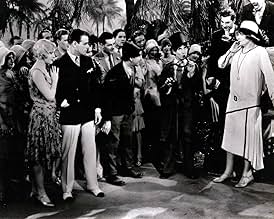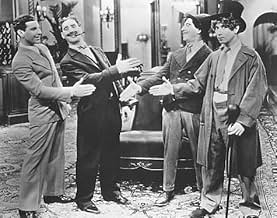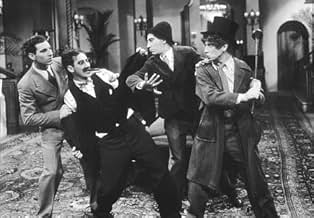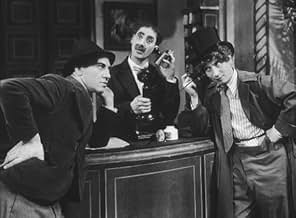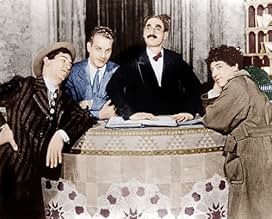IMDb-BEWERTUNG
6,8/10
8549
IHRE BEWERTUNG
Während des Landbooms in Florida betreiben die Marx Brothers ein Hotel, versteigern etwas Land, vereiteln einen Juwelenraub und verhalten sich im Allgemeinen wie sie selbst.Während des Landbooms in Florida betreiben die Marx Brothers ein Hotel, versteigern etwas Land, vereiteln einen Juwelenraub und verhalten sich im Allgemeinen wie sie selbst.Während des Landbooms in Florida betreiben die Marx Brothers ein Hotel, versteigern etwas Land, vereiteln einen Juwelenraub und verhalten sich im Allgemeinen wie sie selbst.
- Regie
- Drehbuch
- Hauptbesetzung
- Auszeichnungen
- 2 Nominierungen insgesamt
Groucho Marx
- Hammer
- (as Marx Brothers)
Harpo Marx
- Harpo
- (as Marx brothers)
Chico Marx
- Chico
- (as Marx Brothers)
Zeppo Marx
- Jamison
- (as Marx Brothers)
Gamby-Hale Ballet Girls
- Dancers
- (as Gamby-Hale Girls)
Dolores Hope
- Dancer
- (Nicht genannt)
Sylvan Lee
- Bell Captain
- (Nicht genannt)
Barton MacLane
- Lifeguard
- (Nicht genannt)
Empfohlene Bewertungen
Entertaining, but not much of a movie. This first effort from the Marx Brothers seems more like a variety show than a narrative film. The brothers, themselves, are hilarious, especially when playing off each other, but they are forced to share the screen with too many other attractions. There is the singing, romantic lead, his girl, the villainess, her cohort, the surly old cop (who also sings) and even a chorus line of dancing girls thrown in for apparently no other reason than to have dancing girls in the film. The story is flimsy and the supporting cast is awful, but that is to be expected. On the upside, the movie is incredibly funny, and that, of course, is its only real aim. Groucho, Harpo and Chico make the film fly whenever they are given the chance. It just seems like the filmmakers didn't quite yet know what to do with them.
The Marx Brothers first motion picture and Paramount's first "all talking, all singing, all dancing" musical will delight fans of the Marx Brothers, musicals and early cinema alike. While dated and somewhat stagey, after all it *was* basically a filmed version of their hit Broadway show, it holds up better than many films of its day. Kaufman and Ryskind, who also wrote the stage show, wrote the screenplay with an eye to making the Marx Brothers wit appear spontaneous and natural. I remember how shocked I was when I first realized the boys were using a script!
The movie is laced with classics of Marxian comedy. The famous "Why a duck?" scene with Groucho and Chico (remember - it's pronounced Chick-o, not Cheek-o, because he was such a womanizer), Groucho answering the telephone at the hotel's front desk (Ice water? Ice water? Peel some onions. That'll make your eyes water.) and Harpo shaking hands with the house detective while all of the hotel silverware falls out of his coat pockets.
Margaret Dumont is priceless as the clueless matron. She claimed in later years it wasn't an act; she really had no idea what the brothers were doing. Regardless, she is the ideal foil for the boys as they tear into "polite" society.
Take a look at The Cocoanuts. You'll see the wellspring from which all that Marx madness flows.
Jon Brian Waugh
The movie is laced with classics of Marxian comedy. The famous "Why a duck?" scene with Groucho and Chico (remember - it's pronounced Chick-o, not Cheek-o, because he was such a womanizer), Groucho answering the telephone at the hotel's front desk (Ice water? Ice water? Peel some onions. That'll make your eyes water.) and Harpo shaking hands with the house detective while all of the hotel silverware falls out of his coat pockets.
Margaret Dumont is priceless as the clueless matron. She claimed in later years it wasn't an act; she really had no idea what the brothers were doing. Regardless, she is the ideal foil for the boys as they tear into "polite" society.
Take a look at The Cocoanuts. You'll see the wellspring from which all that Marx madness flows.
Jon Brian Waugh
A brilliant film debut by the Marx Brothers in this 1929 musical comedy (from Broadway) about land speculation in Florida, jewel thieves, and well the Marx Brothers. In their first film, all the familiar schtick and word play are already in place with Groucho, Chico, and Harpo all excellent.
As usual there is also a romantic young couple--Mary Eaton and Oscar Shaw--and bad guys--Kay Francis and Cyril Ring. Also making her film debut at age 40 is the wonderful and imperious Margaret Dumont. Basil Ruysdael plays the house detective. Zeppo Marx plays the desk clerk.
A blah ballad is sung to death, but The Monkey Doodle-Doo song is terrific and well sung and danced by Eaton (a Broadway star) and chorus. Oddly staged productions number with chorus in monkey suits and tourists milling about in the background. But Eaton is quite good, considering the early sound equipment. And she has great legs.
Francis is fun in her second film (she made five in 1929) but teamed with the unappealing Ring. Shaw is OK but seems too old to be playing the juvenile lead.
But while Dumont, Francis, and Eaton are fun, it's the 3 brothers who dominate the film. Several classic bits, including the viaduct gag, Chico's great piano solo, Harpo getting to steal a few scenes, and of course Groucho riding roughshod over everyone. What a treat! While Kay Francis went on to major stardom in the 30s, Mary Eaton made one disastrous film after this hit, Flo Ziegfeld's Glorifying the American Girl. That ended her starring career in Hollywood.
The more I watch the Marx Brothers the more I appreciate Chico, who was always my least favorite of the 3. Now I notice his perfect comic timing and I just love his piano solos.
As usual there is also a romantic young couple--Mary Eaton and Oscar Shaw--and bad guys--Kay Francis and Cyril Ring. Also making her film debut at age 40 is the wonderful and imperious Margaret Dumont. Basil Ruysdael plays the house detective. Zeppo Marx plays the desk clerk.
A blah ballad is sung to death, but The Monkey Doodle-Doo song is terrific and well sung and danced by Eaton (a Broadway star) and chorus. Oddly staged productions number with chorus in monkey suits and tourists milling about in the background. But Eaton is quite good, considering the early sound equipment. And she has great legs.
Francis is fun in her second film (she made five in 1929) but teamed with the unappealing Ring. Shaw is OK but seems too old to be playing the juvenile lead.
But while Dumont, Francis, and Eaton are fun, it's the 3 brothers who dominate the film. Several classic bits, including the viaduct gag, Chico's great piano solo, Harpo getting to steal a few scenes, and of course Groucho riding roughshod over everyone. What a treat! While Kay Francis went on to major stardom in the 30s, Mary Eaton made one disastrous film after this hit, Flo Ziegfeld's Glorifying the American Girl. That ended her starring career in Hollywood.
The more I watch the Marx Brothers the more I appreciate Chico, who was always my least favorite of the 3. Now I notice his perfect comic timing and I just love his piano solos.
"The Coconuts", being the Marx Brothers' first film, is bound to be a little creaky. This does not mean you should miss it, however! Groucho delivers some of his most scathing one-liners, Harpo provides a perfect blend of devilry and sympathy, and Chico struts like a peacock. Even the fabulous Margaret Dumont gets in on the action, telling her warbling daughter to "stop singing on the beach at all hours" after one truly atrocious song. What brings this film down is bad editing and the godawful songs--Mary Eaton singing "Do the Monkey Doodle Do"--say WHAT!?!? The dancing is,as Groucho states, "A little entertainment--very little." And Harpo's harp solo was really just pasted in there. Stay away from the fast-forward button, though--the songs are just as laughable as the jokes(for all the wrong reasons, of course), as is Kay Francis's drag queen-esque performance. And don't miss the show-stopper "I want my shirt!" My sister and I were rolling on the ground laughing. The love couple is truly nauseating, but a touching moment is provided when the childlike Harpo comforts a heartbroken Mary Eaton. Full of vaudevillian jokes and biting one-liners, this is definitely a film no Marx Brothers fan should miss!
It's been suggested by more than one intelligent film critic that the Golden Age of movie comedies ended with the arrival of sound. Probably the earliest definitive refutation of that is this 1929 film introducing motion-picture audiences to the Marx Brothers.
The great Florida land boom has yet to hit the swampy resort town of Coconut Beach, where hotel owner Mr. Hammer (Groucho) and his assistant (Zeppo) deal with a paucity of paying guests and a platoon of bellhops who haven't been paid in weeks. Hammer manages to placate them ("You wanna be wage slaves? And what makes wage slaves? Wages!") but finds two new arrivals (Chico and Harpo) less easy to sucker while he tries to marry into the wealthy arms of the widow Mrs. Potter (Margaret Dumont).
It may be the Marxes' least revered film from their Zeppo period, but this, the earliest surviving comedy of theirs, provides more than quaint curio appeal or historic interest. It's a nice transfer of their stage act, using one of their successful Broadway plays with nifty direction by Robert Florey and Joseph Santley. While hobbled by early sound technology, there are plenty of neat camera tricks and a less static composition than on offer in the next, more heralded, Marx Brothers film, "Animal Crackers," with overhead shots and cutaways. And the antic wordplay, especially from Groucho, is so fast and dense it provides fresh laughs even after five or six screenings.
I even like the singing and dancing, especially an opening number, shot on a soundstage in Queens, N.Y. but dressed to resemble either Florida or a Haircut 100 video. The "let-us-entertain-you" spirit on ample evidence here evokes a fast-fading pre-Depression giddiness where flappers with wide hips and small chests bat eyes at derby-wearing men glad for the attention.
The Brothers themselves don't really need the help, their craft honed to perfection on stage that they clearly know where the laughs are. Groucho and Chico perform one of their classic routines, the "Viaduct/Why A Duck" number, while Harpo does some prime gurning and props his knee upon every passing dame (and some guys).
Groucho takes a look at Chico and Harpo's lone suitcase when they check in.
"That bag's empty!"
"We fill it up before we leave," answers Chico.
The most glaring weakness of "Cocoanuts" is a lamer-than-usual romantic subplot. Allan Jones and Kitty Carlisle slowed things down in "Night At The Opera," but at least they could sing, unlike Mary Eaton and Oscar Shaw, whose caterwauling here may attract dogs to your doorstep from a mile away. Irving Berlin's score is amazing for its inanity. Though "Monkey-Doodle-Doo" isn't quite as bad as its title, it sounds like "Blue Skies" compared to "When My Dreams Come True" a lifeless ballad reprised five (!) times in the picture, including twice by Harpo (once each on oboe and harp).
Dumont is not yet the presence she became in later Marx films, but Kay Francis offers an attractive foil to the Boys as a designing woman who bites off more than she can chew trying to make a stooge of Harpo. Audiences may start off thinking Basil Ruysdael is just another straight man playing a suspicious cop, but the joke's on us, as we discover by the end.
Speaking of straight men, this may be Zeppo's finest film, if you go along with those who argue he was the master of minimalist comedy, serving up subtle metahumor in the face of his brothers' hi-jinks by literally doing nothing on screen. Not until "Night At The Opera," in which he set a new standard by not appearing at all, would Zeppo be quite this masterful again.
The great Florida land boom has yet to hit the swampy resort town of Coconut Beach, where hotel owner Mr. Hammer (Groucho) and his assistant (Zeppo) deal with a paucity of paying guests and a platoon of bellhops who haven't been paid in weeks. Hammer manages to placate them ("You wanna be wage slaves? And what makes wage slaves? Wages!") but finds two new arrivals (Chico and Harpo) less easy to sucker while he tries to marry into the wealthy arms of the widow Mrs. Potter (Margaret Dumont).
It may be the Marxes' least revered film from their Zeppo period, but this, the earliest surviving comedy of theirs, provides more than quaint curio appeal or historic interest. It's a nice transfer of their stage act, using one of their successful Broadway plays with nifty direction by Robert Florey and Joseph Santley. While hobbled by early sound technology, there are plenty of neat camera tricks and a less static composition than on offer in the next, more heralded, Marx Brothers film, "Animal Crackers," with overhead shots and cutaways. And the antic wordplay, especially from Groucho, is so fast and dense it provides fresh laughs even after five or six screenings.
I even like the singing and dancing, especially an opening number, shot on a soundstage in Queens, N.Y. but dressed to resemble either Florida or a Haircut 100 video. The "let-us-entertain-you" spirit on ample evidence here evokes a fast-fading pre-Depression giddiness where flappers with wide hips and small chests bat eyes at derby-wearing men glad for the attention.
The Brothers themselves don't really need the help, their craft honed to perfection on stage that they clearly know where the laughs are. Groucho and Chico perform one of their classic routines, the "Viaduct/Why A Duck" number, while Harpo does some prime gurning and props his knee upon every passing dame (and some guys).
Groucho takes a look at Chico and Harpo's lone suitcase when they check in.
"That bag's empty!"
"We fill it up before we leave," answers Chico.
The most glaring weakness of "Cocoanuts" is a lamer-than-usual romantic subplot. Allan Jones and Kitty Carlisle slowed things down in "Night At The Opera," but at least they could sing, unlike Mary Eaton and Oscar Shaw, whose caterwauling here may attract dogs to your doorstep from a mile away. Irving Berlin's score is amazing for its inanity. Though "Monkey-Doodle-Doo" isn't quite as bad as its title, it sounds like "Blue Skies" compared to "When My Dreams Come True" a lifeless ballad reprised five (!) times in the picture, including twice by Harpo (once each on oboe and harp).
Dumont is not yet the presence she became in later Marx films, but Kay Francis offers an attractive foil to the Boys as a designing woman who bites off more than she can chew trying to make a stooge of Harpo. Audiences may start off thinking Basil Ruysdael is just another straight man playing a suspicious cop, but the joke's on us, as we discover by the end.
Speaking of straight men, this may be Zeppo's finest film, if you go along with those who argue he was the master of minimalist comedy, serving up subtle metahumor in the face of his brothers' hi-jinks by literally doing nothing on screen. Not until "Night At The Opera," in which he set a new standard by not appearing at all, would Zeppo be quite this masterful again.
Wusstest du schon
- WissenswertesDuring the "Why a duck?" sequence, it seems that Groucho Marx almost calls Chico Marx "Ravelli", which is Chico's character in Animal Crackers. Since they were shooting The Cocoanuts in the morning and acting in Animal Crackers at night, this mix up is understandable.
- PatzerIn the opening scene, Hammer sends Jamison to meet a 4:15 train. When Jamison gets back, he refers to it as a 4:30 train.
- Crazy CreditsThe opening credits are run against a background of negative film of the "Monkey-Doodle-Doo" number.
- Alternative VersionenDeleted Scenes:
- When the bellboys are protesting against being unpaid, Zeppo tells them that Groucho has yet to arise at four in the afternoon. His comforting postscript, that Groucho always gets up on Wednesday, precedes his arrival. This scene was shot, but later cut after the preview, leaving Groucho descending down the stairs, still putting on his coat, allowing time to ward off his staff to catch a 4:15 train.
- Another item that was cut from the preview version of the film was a love ballad sung by Groucho to Margaret Dumont entitled "A Little Bungalow". Originally sung in the play by the romantic leads Polly Potter and Robert Adams, the song slowed up the picture.
- VerbindungenFeatured in 46th Annual Academy Awards (1974)
- SoundtracksFLORIDA BY THE SEA
(1925) (uncredited)
Written by Irving Berlin
Sung off-screen by chorus
Danced by Gamby-Hale Ballet Girls and Allan K. Foster Girls
Top-Auswahl
Melde dich zum Bewerten an und greife auf die Watchlist für personalisierte Empfehlungen zu.
- How long is The Cocoanuts?Powered by Alexa
Details
- Erscheinungsdatum
- Herkunftsland
- Sprache
- Auch bekannt als
- Los cocos
- Drehorte
- Kaufman Astoria Studios - 3412 36th Street, Astoria, Queens, New York City, New York, USA(Paramount Astoria Studios site)
- Produktionsfirma
- Weitere beteiligte Unternehmen bei IMDbPro anzeigen
Box Office
- Budget
- 500.000 $ (geschätzt)
- Weltweiter Bruttoertrag
- 57 $
- Laufzeit1 Stunde 36 Minuten
- Farbe
Zu dieser Seite beitragen
Bearbeitung vorschlagen oder fehlenden Inhalt hinzufügen



